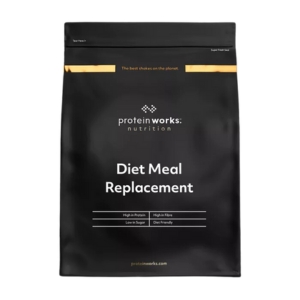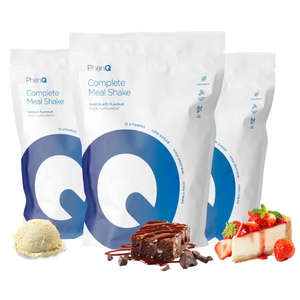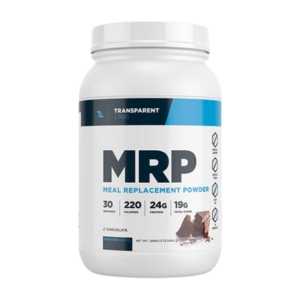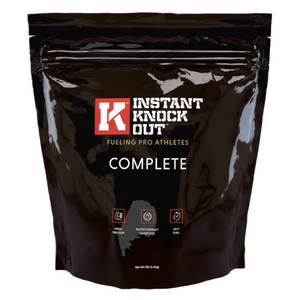 Expert's opinion
Expert's opinion
The article is a subjective view on this topic written by writers specializing in medical writing.
It may reflect on a personal journey surrounding struggles with an illness or medical condition, involve product comparisons, diet considerations, or other health-related opinions.
Although the view is entirely that of the writer, it is based on academic experiences and scientific research they have conducted; it is fact-checked by a team of degreed medical experts, and validated by sources attached to the article.
The numbers in parenthesis (1,2,3) will take you to clickable links to related scientific papers.
The Protein Works Diet Meal Replacement Reviews 2024
All articles are produced independently. When you click our links for purchasing products, we earn an affiliate commission. Learn more about how we earn revenue by reading our advertise disclaimer.

8.5
Quality
8.0
Support Research
8.5
Reputation
8.5
Price
Features
- Contributes to weight loss.
- Good for a calorie-deficit diet.
- 250 calories per shake.
- One shake contains 20 grams of protein.
- A nutritionally complete meal.
- Low in fat.
- Made with real food ingredients.
- Egg-free, palm-oil-free, GMO-free, nut-free, and aspartame-free.
Brand Information
- The site went live in 2012.
- The company focuses on sports nutrition.
- It’s an award-winning company.
- 100 different protein shake flavors.
Medical Benefits
- Helps with weight loss.
- Prevents heart disease.
- Strengthens bones.
- Protects against poor eyesight.
About The Brand
Protein Works went live on December 12, 2012. This company set out to create a world-class selection of health and wellness products. Its focus has been on sports nutrition and creating affordable, nutritious products. So far, the company has served 1 million orders and reached 50 countries.
On the list of products is the Protein Works Diet Meal Replacement shake. It contains 100% premium-grade ingredients and natural flavors, although it is sweetened artificially with sucralose.
What Is Protein Works Diet Meal Replacement?
Protein Works Diet Meal Replacement shake contains natural ingredients. These are tasty and nutritious shakes that you can take in the place of a meal. For instance, have a meal replacement in the morning instead of breakfast.
The meal replacement shake is low in calories and beneficial when you want to lose weight. Protein Works is an award-winning company that produces meal replacement shakes as part of its sports nutrition line.
Feature Product & Coupon

Protein Works Diet Meal Replacement
- Made using natural beneficial, fiber-rich ingredients.
- Non-genetically modified organisms products.
- Nut-free, egg-free, palm-oil-free
- Contains beneficial vitamin and mineral blends.
- Only available on the official website.
- Possible cross-contamination with allergens from the facility.
- Can be thick.
Does It Really Work?
Reading the Protein Works Diet Meal Replacement review paints a positive picture regarding drinking the shakes. The Diet Meal Replacement is filling because of ingredients such as oats.
Each shake has 252 calories, which works well with a calorie-deficit diet. You end up feeling full for longer, and you can stick to a healthy diet. The shakes are smooth and tasty and can replace one or two meals daily.
There’s enough protein concentrate in the Diet Meal Replacement shakes for a healthy diet. The manufacturer includes a blend of slow and fast-release proteins.
Protein Works Diet Meal Replacement Ingredients
The Protein Works Diet Meal Replacement Extreme has essential ingredients that promote weight loss. These include oats, protein blend — soy protein isolate, milk protein concentrate, whey protein concentrate, sunflower lecithin, skimmed milk powder, and a vitamin blend. The mineral blend includes tricalcium phosphate, potassium citrate, sodium chloride, potassium dihydrogen phosphate, magnesium oxide, vitamin C, zinc gluconate, ferric pyrophosphate, vitamin E acetate, potassium iodide, vitamin B3, sodium selenate, vitamin A acetate.
Others included are vitamin B5, copper gluconate, folic acid, vitamin K, and medium chained triglycerides — MCT; sodium caseinate — milk, glucose syrup solids, emulsifier — E472C, soluble maize fiber, flavoring, and salt; thickener — xanthan gum, green tea extract, sweetener — sucralose, and coloring — curcumin.
Oats
Oats are among the major ingredients of Diet Meal Replacement. These are beneficial when you want to lose weight since fiber-rich oats are filling,[1] which helps you eat less.
Protein Blend
The meal replacement shake contains a protein blend containing soy protein isolate, milk protein concentrate, whey protein concentrate, and sunflower lecithin. These key ingredients boost metabolism,[2] which is essential when you are on a weight loss journey.
Skimmed Milk Powder
There is skimmed powder in the meal replacement shake. Skimmed milk in a calorie-controlled diet adds nutritional content such as Vitamin A, Calcium, protein concentrate, and vitamin D.
Tricalcium Phosphate
The comprehensive meal replacement shake contains tricalcium phosphate. This dietary supplement helps prevent calcium deficiency[3] when eating in a calorie deficit.
Potassium Citrate
Potassium citrate is a mineral supplement added to the Protein Works Diet Meal Replacement. This helps to maintain normal potassium levels[4] in the body, which is crucial for different body functions.
Sodium Chloride
The Diet Meal Replacement shake contains sodium chloride,[5] i.e. salt. Besides improving the quality of the shake, sodium chloride is a crucial compound the body needs for maintaining proper blood pressure, among many other functions,[6] although here it is likely just for flavoring.
Magnesium Oxide
Magnesium oxide is an ingredient in the Diet Meal Replacement shake. It helps to lower blood sugar levels[7] in people with type 1 and type 2 diabetes.
Vitamin C
The meal replacement shake contains vitamin C, which helps to boost immunity.[8]
Alternatives To Protein Works Diet Meal Replacement

PhenQ Meal Replacement Shake
- Contains 16 grams of whey protein.
- Gluten-free.
- Low in sugar.
- Can lead to an upset stomach.
- Can cause headaches.

Transparent Labs Meal Replacement Powder
- Contains real food ingredients.
- No artificial colors or preservatives.
- Good for weight loss.
- Only available in chocolate and vanilla.
- Not dairy-free.

Instant Knockout Complete Meal Replacement
- Contains 26 essential minerals and vitamins.
- Has slow-release carbs.
- 400 calories per serving.
- Only available in vanilla.
Health Benefits Of Protein Works Diet Meal Replacement
The Protein Works Diet Meal Replacement has numerous essential ingredients. These ingredients have health benefits that include:
Lowers Risk Of Heart Disease
The meal replacement shake contains essential ingredients such as vitamin C. This essential vitamin helps prevent conditions such as high blood pressure that lead to heart health problems in many people.
Vitamin C supplementation or eating food rich in vitamin C helps lower cardiovascular disease risk. It helps to lower the levels of low-density lipoprotein,[9] i.e., bad cholesterol in the body.
At the same time, vitamin C also lowers the amount of blood triglycerides.
Nine studies were done that included 293,172 participants. An analysis of these studies revealed that taking 700 milligrams of vitamin C daily lowers the risk of heart disease[10] by 25%. A 2020 update[11] supported this 19-year-old study’s conclusions but also stated more study is needed.
Promotes Weight Loss
This Diet Meal Replacement contains oats as part of the main ingredients. Oats[12] are good when you want to lose weight, and the fiber involved lengthens satiety: Eating less helps with weight loss since there’s less body fat storage.
Drinking the shake keeps you feeling full longer, which aids in weight loss. Another advantage of oats is that they have few calories, which is important when you want to lose weight.
Your stomach takes time to empty because of the beta-glucan in oats. Beta-glucan produces Peptide YY — a satiety hormone that helps you consume fewer calories.
Lowers Blood Sugar Levels
The Diet Meal Replacement is rich in magnesium oxide, which helps lower blood sugar levels.
People with diabetes can benefit from this shake that contains magnesium. There’s evidence that magnesium helps lower blood sugar levels in people with type 1 diabetes, type 2 diabetes, and even gestational diabetes.
Prevents Vitamin A Deficiency
There are 260 micrograms of vitamins in one 70-gram serving of the meal replacement shake. Therefore, taking the protein shake is suitable for your health since it helps prevent Vitamin A deficiency.
Vitamin A deficiency can lead to poor eyesight or blindness. The vitamin helps convert light to your eye into an electrical signal sent to your brain. Vitamin A makes up the eye’s rhodopsin in the eye’s retina associated with light sensitivity. Having less rhodopsin can cause vision loss at night, especially with age.
Reduces Oxidative Stress Markers
The meal replacement contains vitamin E acetate, which is important for your body. This vitamin comes in handy in reducing oxidative stress markers. It acts as a powerful antioxidant that boosts antioxidant defenses in the body.
A 2018 study[13] involved 54 participants. They were suffering from diabetic nephropathy, which is kidney damage because of high blood sugar levels. The participants took 800 International Units of vitamin E each day for three months. The results showed an increase in glutathione peroxidase — antioxidant enzymes that prevent oxidative damage to cells.
Boosts Bone Health
A meal replacement shake contains 257 milligrams of calcium. The body needs this essential mineral for bone health and development.[14]
Folks who lack calcium are susceptible to poor bone health, which leads to conditions such as osteoporosis.[15] This condition leads to porous bones that easily fracture.
Boosts Immune System
The body needs vitamin D[16] to boost immune function. This is possible because vitamin D promotes immune response thanks to immunoregulatory and anti-inflammatory properties. Both work to boost immune defenses.
Potential Side Effects
Meal replacement shakes from Protein Works are beneficial. They contain innovative protein blends with vitamin and mineral blends. However, it’s important also to know the potential side effects of meal replacement shakes.
Food additives in meal replacement shakes can pose health risks, especially in long-term consumption. The good news is the Protein Works meal replacements don’t contain additives or preservatives.
However, it’s important not to take them for an extended period. Ensure you resume consuming solid meals regularly after completing your diet. Meal replacements work when you want to lose weight, but avoid taking the shakes for a long time.
How To Take Protein Works Diet Meal Replacement?
Are you trying to figure out how to take Protein Works Diet Meal Replacement? Well, you can take the Diet Meal Replacement any time of the day. And the best part is it works well with a calorie deficit plan.
Add one and a half scoops of the Protein Works Diet Meal Replacement in water. You can make the mix sweeter by adding a splash of Zero Syrups. The syrup adds no calories and is sugar-free. Another option is adding a ripe banana for a more filling effect. Shake the mixture well for 10 seconds before you consume it.
You can substitute one or two meals a day for weight loss.
Protein Works Diet Meal Replacement Reviews: What Do Real Users Say?
My first ever protein powder and now I don’t want to try any others! It wasn’t chalky or lumpy, and it was sweet but not overpowering or rank in flavor. Also, nice stirred into fat-free natural/Greek yogurt for a dessert. This is so far the most cost-effective protein powder I have found, too.
Shelby
Recently changed to the protein works from another competitor as the shakes were far too sweet. I absolutely love the shakes from Protein Works. I love the strawberry and cream, chocolate silk, and caramel latte.
Farrah
I really wasn’t convinced that I’d like this having tried a few other meal replacements. I’m normally still hungry, I get bored of them and they taste really powdery. SO pleasantly surprised by this. Chocolate Silk is very smooth. I add a banana in for breakfast and make it with water and a dash of almond milk, it’s YUMMY! I’m actually looking forward to drinking them. And no hunger… I only want to lose up to 1 stone so hopefully I will be posting weight loss success quite soon because this is going to be a regimen I can stick to for a change. An absolute win for protein works!
Abi Wilkinson
Lovely shake, wish it just wasn’t as thick.
Diane
Final Thought
This Diet Meal Replacement shake is an innovative protein blend you can take when you want to lose weight. It suits folks on a controlled-calorie diet who want to get the best from the protein they consume. The Protein Works Diet Meal Replacement results are positive and show sustainability.
It contains a vitamin and mineral blend full of beneficial vitamins and minerals necessary for good body function. Even replacing one or two meals daily still renders your proper nutrition.
You can take the Diet Meal Replacement shake any time of the day — either breakfast, lunch, or dinner. The shakes contain real food ingredients such as oats, whey protein, and milk.
Frequently Asked Questions
Yes. The Protein Works meal replacement shakes are gluten-free. They contain oats, whey protein, and other essential ingredients that are naturally gluten-free. However, they are made in a factory that has gluten products, so consider cross-contamination.
Yes. The Protein Works Meal Replacement is GMO-free. It is also nut-free, egg-free, and aspartame-free. Again, consider the factory cross-contamination.
Yes. The Protein Works Diet Meal Replacement is a shake containing only 252 calories. The low-calorie content works well with a calorie-restricted diet.
No. The diet meal replacement isn’t FDA-approved. Therefore, it’s important to take it with caution. Always ensure you eat a meal or two daily while taking the shake.
You can take the meal replacement once or twice a day. This is to replace one or two meals per day.
There are 23 essential vitamins and minerals in the Protein Works meal replacement shake.
+ 16 sources
Health Canal avoids using tertiary references. We have strict sourcing guidelines and rely on peer-reviewed studies, academic researches from medical associations and institutions. To ensure the accuracy of articles in Health Canal, you can read more about the editorial process here
- Rebello, C.J., O’Neil, C.E. and Greenway, F.L. (2016). Dietary fiber and satiety: the effects of oats on satiety. Nutrition Reviews, [online] 74(2), pp.131–147. doi:https://doi.org/10.1093/nutrit/nuv063.
- Pesta, D. and Samuel, V.T. (2014). A high-protein diet for reducing body fat: mechanisms and possible caveats. Nutrition & Metabolism, [online] 11(1), pp.53–53. doi:https://doi.org/10.1186/1743-7075-11-53.
- Heaney, R.P., Recker, R.R., Watson, P. and Lappe, J.M. (2010). Phosphate and carbonate salts of calcium support robust bone building in osteoporosis. The American Journal of Clinical Nutrition, [online] 92(1), pp.101–105. doi:https://doi.org/10.3945/ajcn.2009.29085.
- Nih.gov. (2019). Office of Dietary Supplements – Potassium. [online] Available at: https://ods.od.nih.gov/factsheets/Potassium-HealthProfessional/.
- Carcea, M., Narducci, V., Turfani, V. and Mellara, F. (2020). A Comprehensive Study on the Influence of Sodium Chloride on the Technological Quality Parameters of Soft Wheat Dough. Foods, [online] 9(7), pp.952–952. doi:https://doi.org/10.3390/foods9070952.
- Seay, N.W., Lehrich, R.W. and Greenberg, A. (2020). Diagnosis and Management of Disorders of Body Tonicity—Hyponatremia and Hypernatremia: Core Curriculum 2020. American Journal of Kidney Diseases, [online] 75(2), pp.272–286. doi:https://doi.org/10.1053/j.ajkd.2019.07.014.
- Zahra Hamedifard, Alireza Farrokhian, Reiner, Ž., Fereshteh Bahmani, Zatollah Asemi, Ghotbi, M. and Taghizadeh, M. (2020). The effects of combined magnesium and zinc supplementation on metabolic status in patients with type 2 diabetes mellitus and coronary heart disease. Lipids in Health and Disease, [online] 19(1). doi:https://doi.org/10.1186/s12944-020-01298-4.
- Mirelle J.A.J. Huijskens, Walczak, M., Koller, N., Briedé, J.J., Birgit, Melanie, Gerard M.J. Bos and Wilfred T.V. Germeraad (2014). Technical Advance: Ascorbic acid induces development of double-positive T cells from human hematopoietic stem cells in the absence of stromal cells. Journal of Leukocyte Biology, [online] 96(6), pp.1165–1175. doi:https://doi.org/10.1189/jlb.1ta0214-121rr.
- McRae, M.P. (2008). Vitamin C supplementation lowers serum low-density lipoprotein cholesterol and triglycerides: a meta-analysis of 13 randomized controlled trials. Journal of Chiropractic Medicine, [online] 7(2), pp.48–58. doi:https://doi.org/10.1016/j.jcme.2008.01.002.
- Knekt, P., Ritz, J., Pereira, M.A., O’Reilly, É.J., Katarina Augustsson, Fraser, G.E., Uri Goldbourt, Heitmann, B.L., Göran Hallmans, Liu, S., Pirjo Pietinen, Spiegelman, D., Stevens, J., Jarmo Virtamo, Willett, W.C., Rimm, E.B. and Ascherio, A. (2004). Antioxidant vitamins and coronary heart disease risk: a pooled analysis of 9 cohorts. The American Journal of Clinical Nutrition, [online] 80(6), pp.1508–1520. doi:https://doi.org/10.1093/ajcn/80.6.1508.
- Marco Bruno Morelli, Gambardella, J., Castellanos, V., Trimarco, V. and Santulli, G. (2020). Vitamin C and Cardiovascular Disease: An Update. Antioxidants, [online] 9(12), pp.1227–1227. doi:https://doi.org/10.3390/antiox9121227.
- Kristensen, M. and Morten Georg Jensen (2011). Dietary fibres in the regulation of appetite and food intake. Importance of viscosity. Appetite, [online] 56(1), pp.65–70. doi:https://doi.org/10.1016/j.appet.2010.11.147.
- Aghadavod E;Soleimani A;Hamidi G;Keneshlou F;Heidari A;Asemi Z (2018). Effects of High-dose Vitamin E Supplementation on Markers of Cardiometabolic Risk and Oxidative Stress in Patients with Diabetic Nephropathy: a Randomized Double-blinded Controlled Trial. Iranian journal of kidney diseases, [online] 12(3). Available at: https://pubmed.ncbi.nlm.nih.gov/29891745/.
- Vannucci, L., Fossi, C., Quattrini, S., Guasti, L., Pampaloni, B., Giorgio Gronchi, Giusti, F., Romagnoli, C., Luisella Cianferotti, Marcucci, G. and Maria Luisa Brandi (2018). Calcium Intake in Bone Health: A Focus on Calcium-Rich Mineral Waters. Nutrients, [online] 10(12), pp.1930–1930. doi:https://doi.org/10.3390/nu10121930.
- Tümay Sözen, Lale Özışık and Nursel Çalık Başaran (2017). An overview and management of osteoporosis. European Journal of Rheumatology, [online] 4(1), pp.46–56. doi:https://doi.org/10.5152/eurjrheum.2016.048.
- Bivona, G., Agnello, L. and Ciaccio, M. (2018). The immunological implication of the new vitamin D metabolism. Central European Journal of Immunology, [online] 43(3), pp.331–334. doi:https://doi.org/10.5114/ceji.2018.80053.



